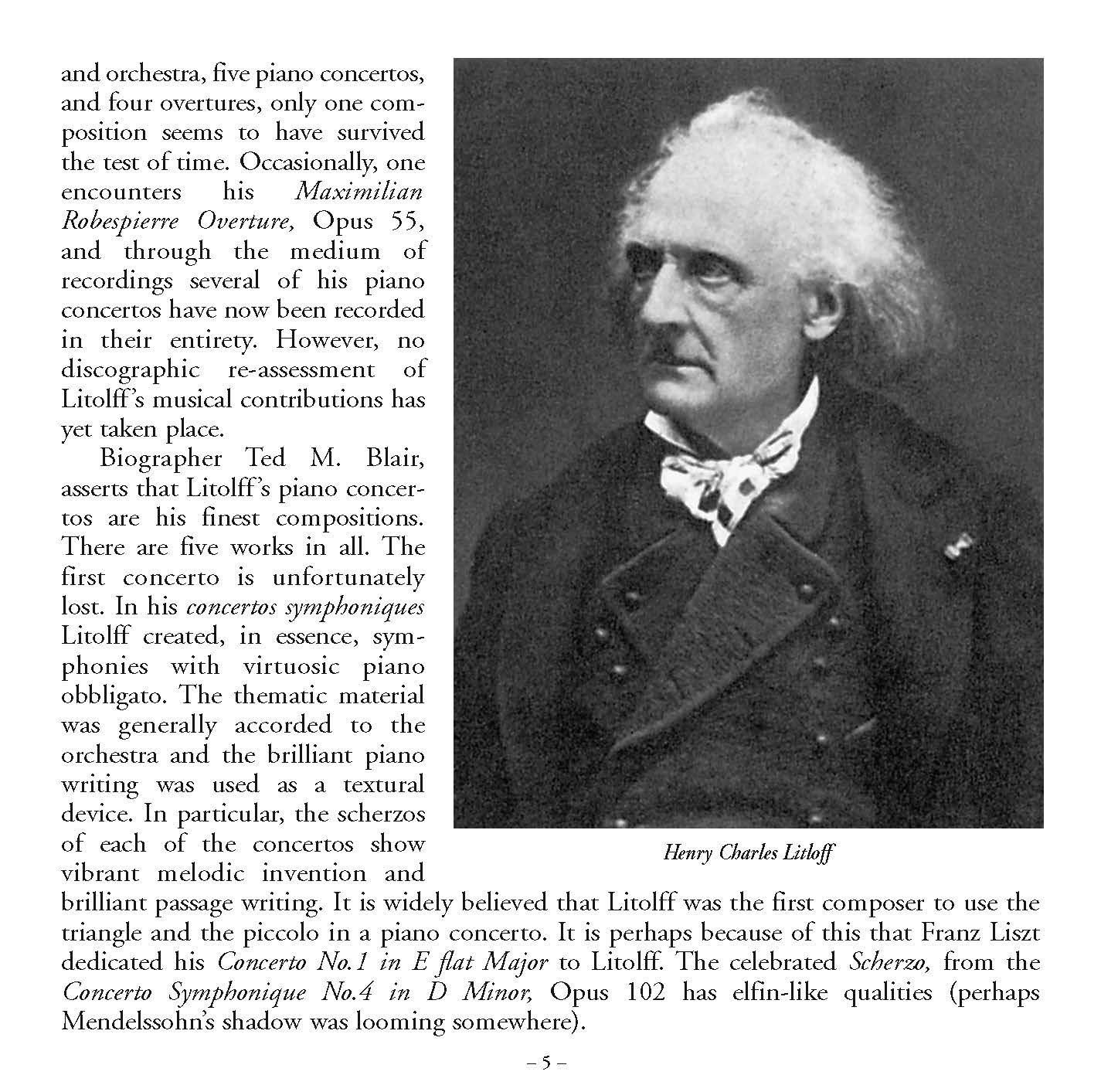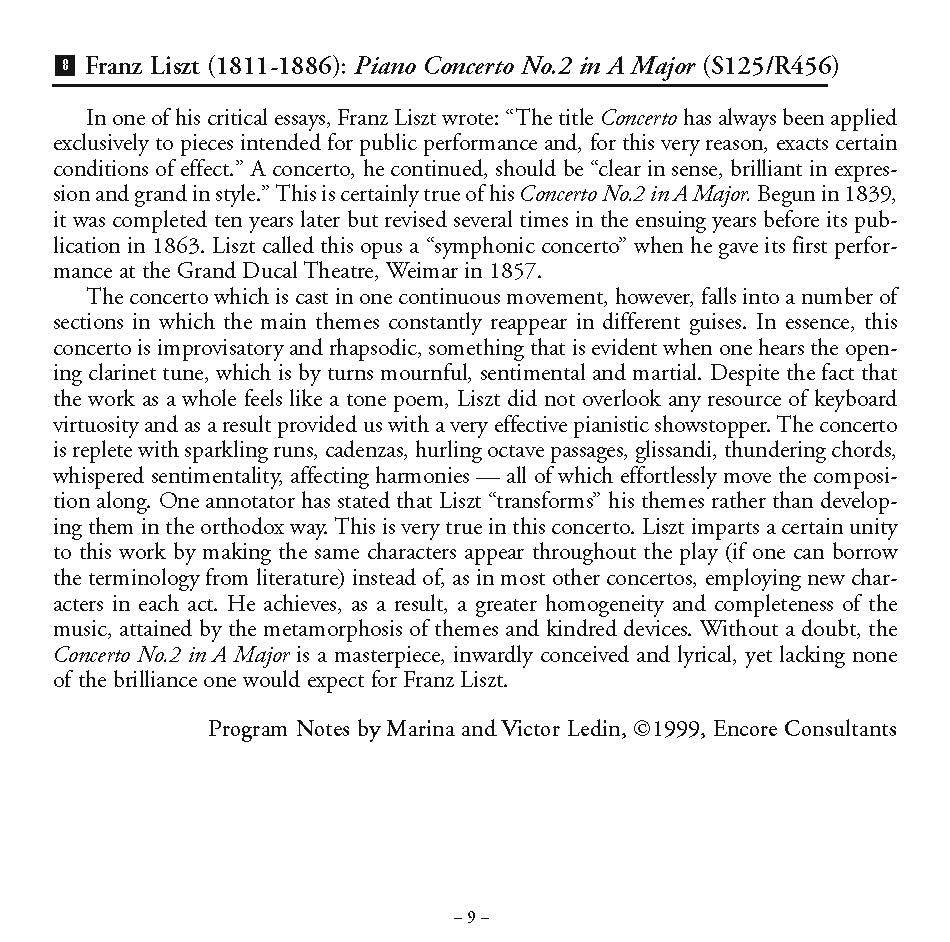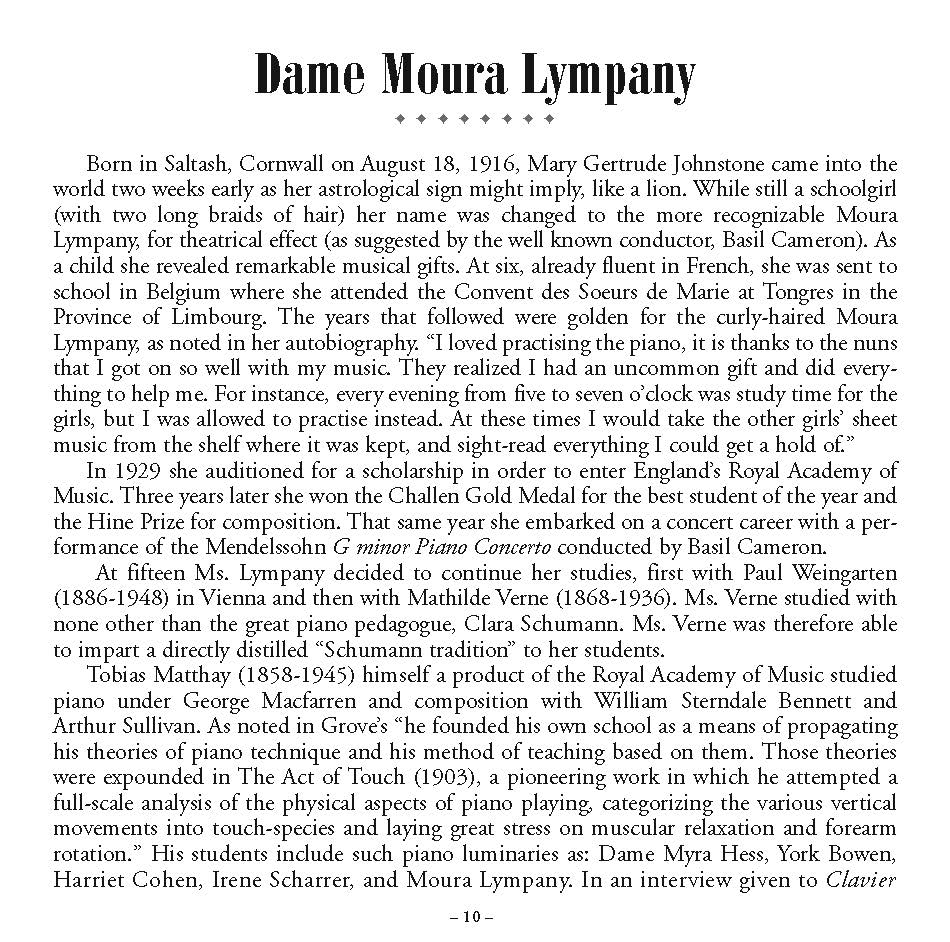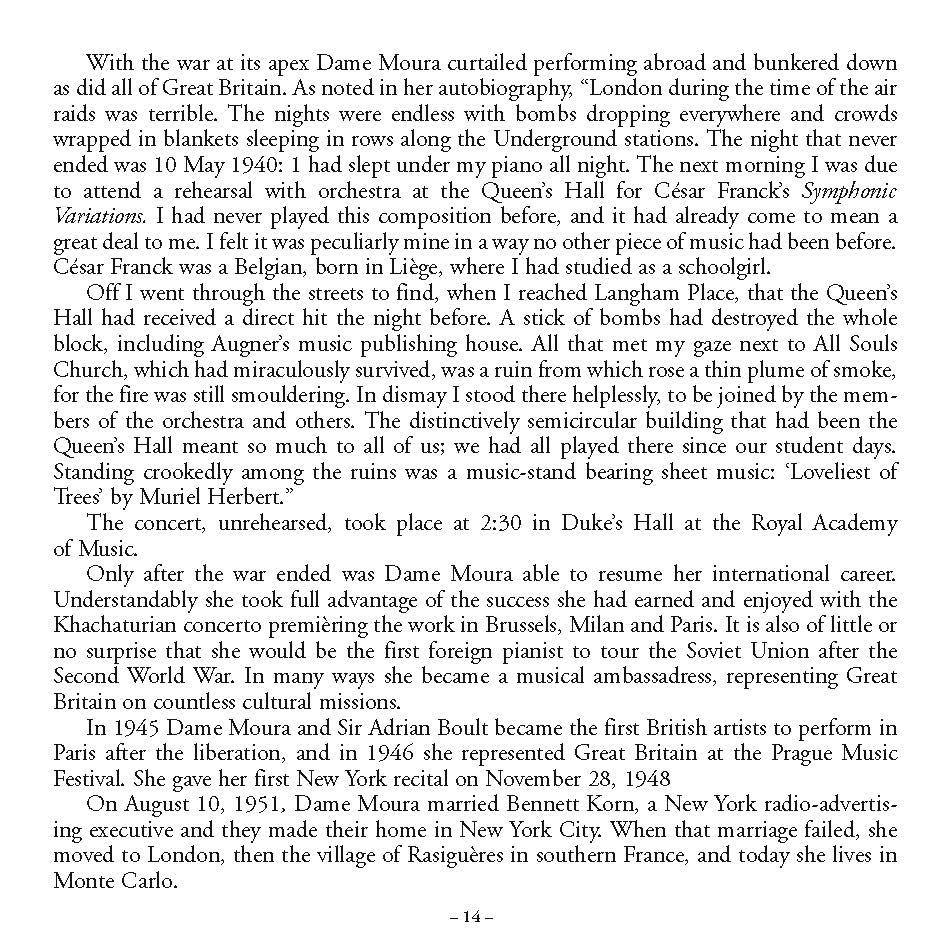1
/
of
16
Dame Moura Lympany: Tribute to a Legend
Dame Moura Lympany: Tribute to a Legend
Regular price
$10.00 USD
Regular price
Sale price
$10.00 USD
Unit price
/
per
Couldn't load pickup availability
Ivory Classics CD-70906
Dame Moura Lympany: Tribute to a Legend
Felix Mendelssohn (1809-1847):
Piano Concerto No. 1 in G Minor, Op. 25
01. 1st Mvt.: Molto allegro con fuoco07:22 ('64)
02. 2nd Mvt.: Andante05:47 ('64)
03. 3rd Mvt.: Presto; Molto allegro e vivace05:43 ('64)
orchestra: Royal Philharmonic Orchestra
conductor: Sir Malcolm Sargent
piano: Dame Moura Lympany
Henry Litolff (1818-1891):
Concerto Symphonique No. 4 in D Minor, Op. 102
04. 2nd Mvt.: Scherzo: Presto07:00 ('64)
orchestra: Royal Philharmonic Orchestra
conductor: Sir Malcolm Sargent
piano: Dame Moura Lympany
Manuel Falla (1876-1946):
Noches en Los Jardines de España ('Nights in the Gardens of Spain')
05. En El Generalife (Allegretto Tranquillo e Misterioso)09:20 ('67)
06. Danza Lejana (Allegro Giusto)04:50 ('67)
07. En Los Jardines de la Sierra de Córdoba (Tempo Vivo)07:56 ('67)
orchestra: RCA Victor Symphony Orchestra
conductor: Massimo Freccia
piano: Dame Moura Lympany
Franz Liszt (1811-1886):
Piano Concerto No. 2 in A Major (S125/R456)
08. Piano Concerto No. 2 in A Major (S125/R456)19:48 ('64)
orchestra: Royal Philharmonic Orchestra
conductor: Sir Malcolm Sargent
piano: Dame Moura Lympany
Piano: Dame Moura Lympany
Producer: Michael Rolland Davis
Engineer: Ed Thompson
Piano: Steinway
(ADD)
Recorded April 28, 1964 in London
April 29, 1964 in London
February 1, 1967 in London
Remastered using 24-Bit State-of-the-Art Technology - HDCD Encoded
Dame Moura Lympany is both a virtuosa and legend. Her playing has been described as a "unique combination of bravura and sound, which is extraordinary in its loveliness." Possessing an enormous repertoire (she is one of the few pianists to play over forty concertos!), she has been accorded numerous honors. In 1992 Moura Lympany became Dame Moura, the first pianist to receive Britain's highest distinction since Clifford Curzon became Sir Clifford in 1977 and the first woman pianist since Myra Hess was honored in 1941. Dame Moura has performed before the public for over 66 years. The piano concertos on this disc recorded in 1964 and 1967 for Reader's Digest Records have never been available on CD and are a testament of her musicianship and virtuosity. This disc has been newly remastered by Ivory Classics using 24-bit HDCD technology.
Disc.Reviews
The gem here is the Mendelssohn Concerto. Lympany had made her debut with it aged twelve in Harrogate, later recording it with Kubelik and the Philharmonia. That competed in the catalogues with such as Eileen Joyce and Fistoulari, Sanroma and Fiedler and Dorfmann and Goehr. It was at the initial run through of the recording that Walter Legge, who was producing, told Lympany that she was playing it like a little girl and sent her home to think about it. The result was a faster probably flashier performance - and one much more to Legge's liking at least (four years earlier the authoritarian Legge had bawled at Albert Sammons who was trying to record the Delius Violin Concerto "You're too near the mike, Albert, get back, back, BACK.")
For the 1964 remake of the Mendelssohn, (first recorded in 1925 by Moiseiwitsch incidentally) and licensed from Reader's Digest, Lympany was accompanied by Malcolm Sargent and the RPO. They are on splendid form, Sargent notably incisive and pliant when required, living up to his high reputation as an accompanist. Lympany adopts some persuasive though somewhat unorthodox tempi. The slow movement in her hands becomes a graceful and fluent one, forward-moving and less inclined to luxuriate whilst the finale is rather broader than one would perhaps find elsewhere. This adds a very distinctive profile to the work and one that feels right, structurally and expressively. There is plenty of drive and flexibility in the first movement (exactly the tempo Moiseiwitsch took over fifty years before her) and the woodwind are notably eloquent. Sargent encourages some powerful strings in the slow movement and in the finale Lympany is full of wit, accompanied by some insouciant string pointing and a strutting confidence. Her Litolff scherzo is good and enjoyable but her de Falla a good deal more than that. No-one will necessarily efface de Larrocha here but Lympany is marvelous at the delicacy and the drive, the atmospherics and the pyrotechnics; above all the evocative conjuring up of time and place - full marks to Massimo Freccia as well for his conducting. In the Liszt A major Concerto, as one would perhaps expect, her command is never at the expense of loss of control. This is eloquent, powerful and technically admirable playing that refuses even to countenance the kind of spectacular gloss that other less mature musicians seek to inflict on Liszt. There is no sense of grandstanding and every sense of considered sensitivity.
These warmly recommended performances sound quite splendid in these transfers. There are good notes and even better photographs.
Music Web.com, Mar. 2003
All these recordings, dating 1964 to 1967, appear on general release for the first time: a glorious reminder of Dame Moura in her prime. The Litolff could hardly be more vivacious. How she revels in the scintillating tracery of Falla's sumptuous and indeed unique nocturne, combining an immaculate taste with an exhilarating joie de vivre. In the Liszt she rides every pianistic storm with effortless mastery. This is a performance of superb authority. All the recordings have come up excellently and the booklet is lavishly illustrated with splendid photographs of the composers and of Dame Moura at her most decollete.
Gramophone, Jun. 2000
British pianist Moura Lympany, born in 1918 developed into an artist who had temperament, a beautiful sound, and a world-class (but never show-off) technique. She used fast tempos, took total command when she played with orchestra (again without ever trying to assert herself). In short she was a sensitive musician as well as a spectacular pianist. These well-transferred recordings, made at the height of her career, date from 1964 and 1967 and show her at her best - which means aristocratic lyricism, with plenty of power when needed. In the Liszt A-Major Concerto I like her unruffled delivery, seamless melodic flow, and her avoidance of fake heroics. This is elegance personified, a Liszt that completely eschews vulgarity, a Liszt that is architecturally sound, a Liszt that has power held in restraint. In the Litolff Scherzo, Lympany makes the most of it. In the Falla Noches Lympany is quiet and atmospheric, playing it very much in the De Larrocha manner. As for the Mendelssohn, it lies beautifully in the Lympany fingers, and we get a fleet, classically-oriented performance. Dame Moura no longer performs, and it's a joy to be reminded of what she was.
Harold C. Schonberg, American Record Guide, Oct. 1999
Dame Moura Lympany, now in her eighties and living in Monte Carlo, has managed to cultivate a reputation as a "legendary" artist. The sound from these recordings made in 1964 and 1967 is excellent.
Fanfare Magazine, Oct. 1999
Dame Moura Lympany is a keyboard legend who has been before the public well nigh 65 years. The sound of these 1964 and 1967 originals is brilliant and hard-edged reprocessing has clarified the high end. Lympany reaches for scintillation and bravura. The Falla has a fluid, luxuriant sensuousness that rivals de Larrocha and Casadesus in a cumulative effect.
Audiophile Audition, Oct. 1999
View full details
Dame Moura Lympany: Tribute to a Legend
Felix Mendelssohn (1809-1847):
Piano Concerto No. 1 in G Minor, Op. 25
01. 1st Mvt.: Molto allegro con fuoco07:22 ('64)
02. 2nd Mvt.: Andante05:47 ('64)
03. 3rd Mvt.: Presto; Molto allegro e vivace05:43 ('64)
orchestra: Royal Philharmonic Orchestra
conductor: Sir Malcolm Sargent
piano: Dame Moura Lympany
Henry Litolff (1818-1891):
Concerto Symphonique No. 4 in D Minor, Op. 102
04. 2nd Mvt.: Scherzo: Presto07:00 ('64)
orchestra: Royal Philharmonic Orchestra
conductor: Sir Malcolm Sargent
piano: Dame Moura Lympany
Manuel Falla (1876-1946):
Noches en Los Jardines de España ('Nights in the Gardens of Spain')
05. En El Generalife (Allegretto Tranquillo e Misterioso)09:20 ('67)
06. Danza Lejana (Allegro Giusto)04:50 ('67)
07. En Los Jardines de la Sierra de Córdoba (Tempo Vivo)07:56 ('67)
orchestra: RCA Victor Symphony Orchestra
conductor: Massimo Freccia
piano: Dame Moura Lympany
Franz Liszt (1811-1886):
Piano Concerto No. 2 in A Major (S125/R456)
08. Piano Concerto No. 2 in A Major (S125/R456)19:48 ('64)
orchestra: Royal Philharmonic Orchestra
conductor: Sir Malcolm Sargent
piano: Dame Moura Lympany
Piano: Dame Moura Lympany
Producer: Michael Rolland Davis
Engineer: Ed Thompson
Piano: Steinway
(ADD)
Recorded April 28, 1964 in London
April 29, 1964 in London
February 1, 1967 in London
Remastered using 24-Bit State-of-the-Art Technology - HDCD Encoded
Dame Moura Lympany is both a virtuosa and legend. Her playing has been described as a "unique combination of bravura and sound, which is extraordinary in its loveliness." Possessing an enormous repertoire (she is one of the few pianists to play over forty concertos!), she has been accorded numerous honors. In 1992 Moura Lympany became Dame Moura, the first pianist to receive Britain's highest distinction since Clifford Curzon became Sir Clifford in 1977 and the first woman pianist since Myra Hess was honored in 1941. Dame Moura has performed before the public for over 66 years. The piano concertos on this disc recorded in 1964 and 1967 for Reader's Digest Records have never been available on CD and are a testament of her musicianship and virtuosity. This disc has been newly remastered by Ivory Classics using 24-bit HDCD technology.
Disc.Reviews
The gem here is the Mendelssohn Concerto. Lympany had made her debut with it aged twelve in Harrogate, later recording it with Kubelik and the Philharmonia. That competed in the catalogues with such as Eileen Joyce and Fistoulari, Sanroma and Fiedler and Dorfmann and Goehr. It was at the initial run through of the recording that Walter Legge, who was producing, told Lympany that she was playing it like a little girl and sent her home to think about it. The result was a faster probably flashier performance - and one much more to Legge's liking at least (four years earlier the authoritarian Legge had bawled at Albert Sammons who was trying to record the Delius Violin Concerto "You're too near the mike, Albert, get back, back, BACK.")
For the 1964 remake of the Mendelssohn, (first recorded in 1925 by Moiseiwitsch incidentally) and licensed from Reader's Digest, Lympany was accompanied by Malcolm Sargent and the RPO. They are on splendid form, Sargent notably incisive and pliant when required, living up to his high reputation as an accompanist. Lympany adopts some persuasive though somewhat unorthodox tempi. The slow movement in her hands becomes a graceful and fluent one, forward-moving and less inclined to luxuriate whilst the finale is rather broader than one would perhaps find elsewhere. This adds a very distinctive profile to the work and one that feels right, structurally and expressively. There is plenty of drive and flexibility in the first movement (exactly the tempo Moiseiwitsch took over fifty years before her) and the woodwind are notably eloquent. Sargent encourages some powerful strings in the slow movement and in the finale Lympany is full of wit, accompanied by some insouciant string pointing and a strutting confidence. Her Litolff scherzo is good and enjoyable but her de Falla a good deal more than that. No-one will necessarily efface de Larrocha here but Lympany is marvelous at the delicacy and the drive, the atmospherics and the pyrotechnics; above all the evocative conjuring up of time and place - full marks to Massimo Freccia as well for his conducting. In the Liszt A major Concerto, as one would perhaps expect, her command is never at the expense of loss of control. This is eloquent, powerful and technically admirable playing that refuses even to countenance the kind of spectacular gloss that other less mature musicians seek to inflict on Liszt. There is no sense of grandstanding and every sense of considered sensitivity.
These warmly recommended performances sound quite splendid in these transfers. There are good notes and even better photographs.
Music Web.com, Mar. 2003
All these recordings, dating 1964 to 1967, appear on general release for the first time: a glorious reminder of Dame Moura in her prime. The Litolff could hardly be more vivacious. How she revels in the scintillating tracery of Falla's sumptuous and indeed unique nocturne, combining an immaculate taste with an exhilarating joie de vivre. In the Liszt she rides every pianistic storm with effortless mastery. This is a performance of superb authority. All the recordings have come up excellently and the booklet is lavishly illustrated with splendid photographs of the composers and of Dame Moura at her most decollete.
Gramophone, Jun. 2000
British pianist Moura Lympany, born in 1918 developed into an artist who had temperament, a beautiful sound, and a world-class (but never show-off) technique. She used fast tempos, took total command when she played with orchestra (again without ever trying to assert herself). In short she was a sensitive musician as well as a spectacular pianist. These well-transferred recordings, made at the height of her career, date from 1964 and 1967 and show her at her best - which means aristocratic lyricism, with plenty of power when needed. In the Liszt A-Major Concerto I like her unruffled delivery, seamless melodic flow, and her avoidance of fake heroics. This is elegance personified, a Liszt that completely eschews vulgarity, a Liszt that is architecturally sound, a Liszt that has power held in restraint. In the Litolff Scherzo, Lympany makes the most of it. In the Falla Noches Lympany is quiet and atmospheric, playing it very much in the De Larrocha manner. As for the Mendelssohn, it lies beautifully in the Lympany fingers, and we get a fleet, classically-oriented performance. Dame Moura no longer performs, and it's a joy to be reminded of what she was.
Harold C. Schonberg, American Record Guide, Oct. 1999
Dame Moura Lympany, now in her eighties and living in Monte Carlo, has managed to cultivate a reputation as a "legendary" artist. The sound from these recordings made in 1964 and 1967 is excellent.
Fanfare Magazine, Oct. 1999
Dame Moura Lympany is a keyboard legend who has been before the public well nigh 65 years. The sound of these 1964 and 1967 originals is brilliant and hard-edged reprocessing has clarified the high end. Lympany reaches for scintillation and bravura. The Falla has a fluid, luxuriant sensuousness that rivals de Larrocha and Casadesus in a cumulative effect.
Audiophile Audition, Oct. 1999
































